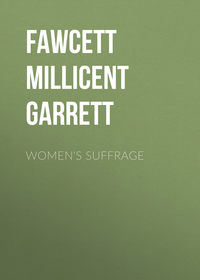 полная версия
полная версияSome Eminent Women of Our Times
For thirty years Lucretia Mott hardly ever let a day pass without doing something to weaken the fabric of slavery, which she felt to be the greatest curse of her native land. Her manner and voice were sweet, solemn, and tranquil; her small and fragile figure, her exquisite womanliness of demeanour, made it difficult to believe that she could become the object of violent hatred and persecution. Yet she had often known what it was to stand on a platform in the midst of a shower of stones and vitriol, and to endure in silence the unmanly insults of the pro-slavery press. The simple and direct sincerity of her mind, her forgetfulness of self, and her tranquil courage, carried conviction to the minds of thousands that she had a message worth listening to. But at first many even of her own religious community thought it necessary to show their disapprobation of her conduct, by refusing to recognise her when they met. She owned that this “had caused her considerable pain,” but it never caused her to swerve for a moment from the course she felt to be that of duty. She usually took a share of the seat behind the door in railway cars, because that place was ordinarily assigned to negroes, and would converse kindly with her fellow-passengers there.
At the celebrated trial in 1859 of Daniel Dangerfield, a fugitive slave, Lucretia Mott remained all through the long hours of suspense by the side of the prisoner. The trial and the courthouse were watched by two crowds, both in the greatest anxiety and suspense, one hoping for the release, the other, and by far the larger and more dangerous, hoping for the condemnation of the man. At last the long trial ended in victory for the right. Daniel Dangerfield was declared a free man; but the authorities of the court thought it would be impossible to get him away in safety through the angry pro-slavery crowd, without an escort of police. Their fears were found to be groundless, for when the doors of the court were thrown open, and the slave walked out, a free man, Lucretia Mott, the aged Quaker lady, was by his side; her hand on his arm was a sufficient protection, and he passed through the angry crowd in safety.
Very soon after this came the War of Secession. The Abolitionists knew, though the politicians did not, that this war would decide the question of slavery. As all the world knows now, they were right. The American people were enabled to prevent the secession of the slave states; and in 1863 a proclamation of President Lincoln announced the Abolition of Slavery in the United States. Lucretia Mott lived for seventeen years after this crowning victory of her life’s labours. She died on 11th November 1880, universally respected, and loved by those who knew her.
THE END1
Written for the Jubilee, June 1887.
2
A crore of rupees is a million. At that time a rupee was worth 2s.; therefore a crore of rupees would equal £100,000.
3
Elizabeth Gilbert and Her Work for the Blind. By Frances Martin. Macmillan and Co.
4
A very interesting memoir of Miss Austen has been written by her nephew, Mr. Austen Leigh. All who love her works should read it, and thereby come to know and love the woman.
5
Sister Dora: a Biography. By Margaret Lonsdale.



